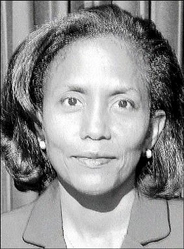

Charmaine DeLisser and Errol Morrison
UTech focus
The University of Technology, Jamaica (UTech) has partnered with the International Telecommunication Union (ITU), Geneva, Switzerland, and Cisco Systems, California, USA, for the establishment of an Internet Training Centre at the university's Papine campus.
The Internet Training Centre, housed in the faculty of engineering and computing, was launched at a special ceremony held on Monday, November 23, joining a global network of more than 75 Internet Training Centres assisting countries to meet their human resource requirements for skilled Internet and IP-related training programmes.
The ITU cooperates with both public - and private-sector partners to establish centres, provide training for instructors and make available related training curricula. Through a train-the-trainers approach, the ITU works with public and private sector stakeholders such as UTech to provide students in developing countries with access to affordable and relevant information technology (IT) training.
An important milestone
Speaking at the launch, Charmaine DeLisser, dean of the faculty of engineering and computing, said that the partnership with ITU and the Cisco Training Academy represents an important milestone in strengthening the university's capacity to contribute to national development goals, parti-cularly with respect to Jamaica's Millennium Development Goal (MDG) to increase Internet users per 1000 of the population. President, Professor Errol Morrison, noted that UTech feels privileged to have acquired the Internet Training Centre that will serve to advance UTech's reputation for being at the forefront of training in information technology and for training work-ready graduates with the requisite hands-on training to function in a know-ledge-based economy.
Systematic development
Principal director, information and telecommunications in the Office of the Prime Minister, Jo-Anne Archibald, in her remarks said the establishment of the Internet Training Centre at UTech "is consistent with Government's own thrust for systematic development of education to support advanced research in ICT".
Robert Shaw, head, human capacity, ITU, told the gathering of IT professionals, university lecturers and students, that the partnership with UTech represented part of a broader effort to spread the benefits of IT training around the world, noting that its impact on education across the world has been enormous.
The School of Graduate Studies, Research and Entrepreneurship, UTech, will host a public lecture focusing on 'Science and Technology for Development: Lessons from the History of Science and Technology' on Tuesday, December 8, at 5:30 p.m. at Lecture Theatre 23 located at the College of Health Sciences on the UTech Papine campus. The lecture will be presented by Professor Paul Josephson of the Department of History, Colby College, USA. The public is invited to attend. For further information contact the School of Graduate Studies, Research and Entrepreneurship at 927-1680-8, ext 3204.
UWI Notebook
Depression to Decolonization: Barclays Bank (DCO), 1926-1962, is the first major academic business history of a commercial bank's operations in the West Indies. Barclay's Bank (DCO) was, at that time, the world's largest multinational bank with a branch network that spanned the Middle East, Africa, the Mediterranean and the British West Indies.
Based upon the records of the bank, as well as colonial office records and other documentation, this history provides a detailed examination of the performance and strategies of the bank during periods of crisis and change in the West Indies. It provides a detailed examination of the bank's performance during the Depression years, as well as during the period of economic expansion in the region after 1940.
History of commercial banking
The discussion covers the bank's products and services, the competitive challenges it faced from the Canadian banks, the regulatory environment in which it operated, its recruitment practices and organisational structure. The work provides for a better understanding of the history of the commercial banking activity in the region during this period and, in that regard, helps to expand the scope of West Indian historiography into the field of business history and, by so doing, makes a significant contribution to the economic and social history of the West Indies during the first half of the 20th century. Accessibly written, the book should appeal to those within and outside the academic community.
Writer Kathleen E.A. Monteith is senior lecturer in history at the University of the West Indies, Jamaica. She is the author of several articles and a co-editor of 'Jamaica in Slavery and Freedom: History, Heritage and Culture'.